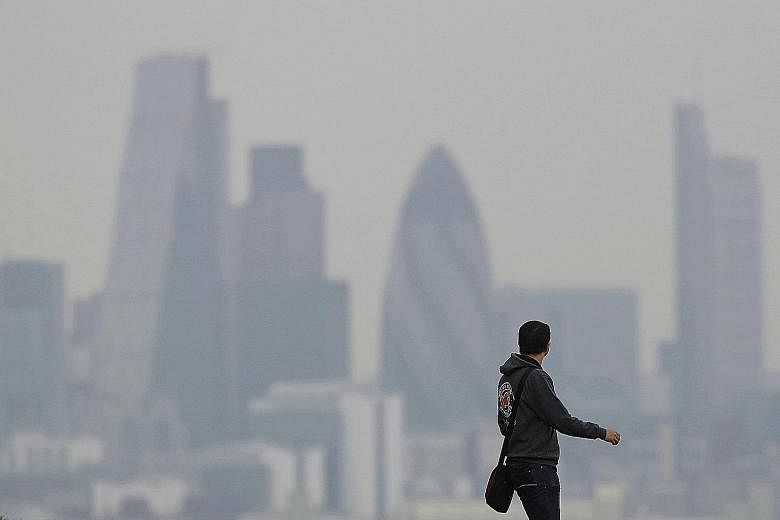LONDON • Air pollution is prematurely ageing the faces of city dwellers by accelerating wrinkles and age spots, according to emerging scientific research.
The effects of toxic fumes on skin are being seen in both Western cities, such as London and New York, as well as in more visibly polluted Asian cities and, in some cases, may be the primary cause of ageing.
The pollution is also being linked to worsening skin conditions such as eczema and hives.
The scientific discoveries are now driving the world's biggest cosmetics companies to search for solutions, including medicine-like compounds that directly block the biological damage. But doctors warn that some common skin care routines, such as scrubs, make the damage from air pollution even worse.
"With traffic pollution emerging as the single most toxic substance for skin, the dream of perfect skin is over for those living and working in traffic-polluted areas unless they take steps to protect their skin right now," said Dr Mervyn Patterson, a cosmetic doctor at Woodford Medical clinics in Britain.
"Unless people do more, they will end up wearing the pollution on their faces in 10 years' time. It is definitely something people now need to take seriously."
Professor Jean Krutmann, director at the Leibniz Research Institute for Environmental Medicine in Germany, said: "UV (damage from the sun) was really the topic in skin protection for the last 20 to 30 years. Now I think air pollution has the potential to keep us busy for the next few decades."
Air pollution in urban areas, much of which comes from traffic, includes tiny particles called PMs, nitrogen dioxide (NO2) and chemicals such as polycyclic aromatic hydrocarbons (PAHs).
"What is very clear is that PMs are a problem for skin," said Prof Krutmann, whose work has shown PMs increase age spots and wrinkles.
But one of the newest studies showed NO2 also increases ageing. Prof Krutmann said other factors, such as UV exposure, nutrition and smoking contribute to ageing.
Understanding exactly how air pollution causes skin damage is at an early stage, according to him. But many of the pollutants are known to pass easily through the skin and cause a variety of impacts.
"These agents have a very irritating effect and, once they get into the skin, they activate multiple pathways of inflammation," said Dr Patterson. "Some pathways ignite the melanocytes, which create far too much pigment and end up giving you unwanted sun spots.
"Other pathways ignite messengers that make blood vessels grow - that's what results in increased redness and potentially rosacea," he said.
"Also, if you damage skin, it goes into repair mode and excites enzymes which re-absorb damaged collagen. When you have too much chronic inflammation, these enzymes remove more collagen than your skin can create. This produces skin laxity and that's where fine lines and wrinkles come in."
Major beauty companies have begun their own research and are launching the first products formulated to battle skin damage from toxic air.
Dr Frauke Neuser, senior scientist for Olay, a Procter and Gamble brand, has run studies showing significantly lower skin hydration in people living in polluted areas and laboratory studies showing that diesel fumes and PMs cause inflammation in skin cells.
Researchers are now working on medicine-like compounds that block the damage from air pollution from occurring in the first place.
Dr Patterson said it is possible for people to give themselves some protection now.
"You don't have to sit back passively and put up with it. You can take sensible, easy steps that will make a difference.
"If your skin is really healthy, it is quite a good barrier," he said, explaining that the top layer is like a roof - flattened cells like tiles separated by protective lipids.
"Certain skincare products are very disruptive to the surface of the skin," he warned. "So a darling of the industry is retinoids, but these have a very profound negative effect on barrier function.
"Another darling is glycolic acid, but it is also very disruptive to the external skin barrier.
"People think these are good skincare, making the skin look smoother, but they are not helpful for the overall health of the skin barrier."
He is also dismissive of face scrubs. "The skin is trying to make this wonderful defence mechanism and what do women and men do? They scrub the hell out of it. It just doesn't make sense."
He said products that help repair the skin barrier, by delivering the pre-cursor lipids the cells need, are beneficial, as are ones that tackle inflammation.
"You can also put on a very nice physical shield in the form of good quality mineral make-up," he said.
"That produces an effect like a protective mesh and probably has some trapping effect, protecting against the initial penetration of particles.
"But you also need always to try to remove that shield in the evening, washing the slate clean every night."
GUARDIAN

